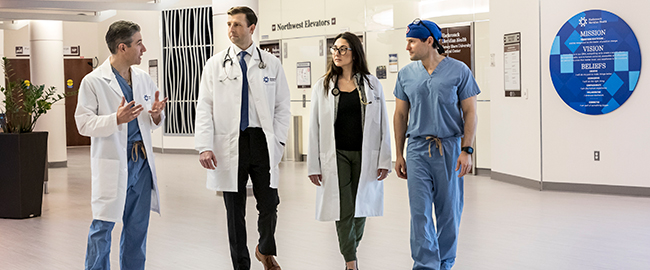Heart Surgery Options
What is Heart Surgery?
Performed by a cardiac surgeon, heart surgery or cardiovascular surgery is used to treat complications of heart disease, correct birth defects in the heart or treat issues within the heart valves, known as valvular heart disease. Heart surgery can also include a heart transplant surgery or procedures to help those in need of a heart transplant.Who Is a Candidate for Heart Surgery?
Heart surgery should be considered when your symptoms are not relieved by medicine, nonsurgical procedures such as angioplasty or stenting for blocked coronary arteries or other reasons. Your cardiac surgeon and Heart Team will determine the best type of heart surgery for you based on your heart condition and other health factors.
Types of Heart Surgery
Our nationally acclaimed heart surgery teams have the expertise to perform a variety of minimally invasive and open-heart surgeries, including:
The surgeon restores blood supply to the heart by using arteries and veins from other parts of the body to “bypass” the blocked part of a coronary artery. The Heart & Vascular Hospital at Hackensack University Medical Center was the first in the region to perform this type of surgery. Learn more about CABG surgery.
Used in coronary artery bypass graft surgery, endoscopic vein harvesting uses a small incision to obtain a vein or artery from a different part of the body to create a detour or “bypass” around the blocked coronary artery. The smaller incision results in a lower risk for infection, faster recovery and better clinical outcomes.
This minimally invasive surgery involves inserting a stent graft into your aorta to support the weakened wall of your artery.
When heart valve disease cannot be treated with medication, heart valve repair surgery or replacement surgery (insertion of an artificial heart valve) may be necessary. Our surgeons are experts in performing all types of heart valve surgeries with excellent outcomes, including aortic valve repair and replacement and complex mitral valve replacements and repairs. Learn more about heart valve surgery.
An option for patients with advanced heart failure that does not respond to conventional therapies, an LVAD is a mechanical pump that helps the heart pump blood to the rest of the body. Learn more about Left Ventricular Assist Device (LVAD) implant procedures.
In this procedure to treat an irregular heart rhythm (atrial fibrillation), the surgeon uses a scalpel or device that delivers heat or cold energy to create a pattern or “maze” of scar tissue that prevents random electrical heart signals from causing atrial fibrillation.
Micra TPS is the world’s smallest, minimally invasive cardiac pacemaker. It is a new type of heart device that treats patients with bradycardia, a common heart condition characterized by a slow or irregular heart rhythm. Unlike traditional pacemakers, the Micra® Transcatheter Pacing System (TPS) is a miniaturized, fully self-contained pacemaker that delivers the most advanced pacing technology available to patients via a minimally invasive approach.
Our minimally invasive approaches use small incisions and don’t require opening the chest bone, which often means shorter recovery time, less postoperative pain and lower risk for infection.
Commonly referred to as a “beating heart bypass surgery,” the cardiovascular surgeon performs this surgery on the heart while it is beating, rather than using a heart-lung bypass machine. Depending on the patient’s condition, this procedure takes three to six hours and requires less time in the hospital and in recovery than a traditional bypass surgery.
This is the most common surgery to repair an aortic aneurysm. The surgeon replaces the weakened section of your aorta with a synthetic tube or “graft.”
Robotic-assisted surgery offers a minimally invasive way to treat heart valve disorders, atrial fibrillation, coronary artery disease and other cardiac diseases. And because it requires smaller incisions, it results in a decreased risk for infection, less pain and a faster recovery. and use robotic and less invasive techniques to reduce pain, disability and recovery time. Learn more about our robotic-assisted cardiac surgery options.
An innovative treatment option, this is the latest minimally invasive procedure for patients with critical aortic stenosis being offered through Hackensack University Medical Center and Jersey Shore University Medical Center. This option is giving new hope to patients who have been determined to be inoperable due to other coexisting medical conditions. For most patients with severe aortic stenosis (AS), the gold standard treatment is a surgical procedure known as Aortic Valve Replacement (AVR). Today, patients with severe AS who were once considered too high risk for traditional surgery can now explore other treatment options with Transcatheter Aortic Valve Replacement (TAVR). Learn more about TAVR
Sometimes valve disease can be treated with medication, but depending on the severity of the problem, valve repair surgery or replacement surgery (insertion of an artificial heart valve) is necessary. At Hackensack Meridian Health, our surgeons are experts in performing all types of valve surgeries with excellent outcomes, including aortic valve repair and replacement and complex mitral valve replacements and repairs. Learn more about valve surgery.
Additional Cardiac Surgical Procedures
Our cardiac surgical procedures also include:
- Coronary Artery Bypass Graft (CABG) Surgery
- Off-Pump Coronary Artery Bypass Grafting
- Endoscopic Vein Harvesting
- Minimally Invasive Valve Replacement/Repair
- Ventricular Assist Device Implantation
- MAZE Procedure for Atrial Fibrillation
Convenient Access to Expert Heart Care
Hackensack Meridian Health offers patients access to innovative surgical procedures at these two major academic medical centers, as well as highly coordinated treatment and cardiac rehabilitation services through our integrated network of hospitals located close to home.









